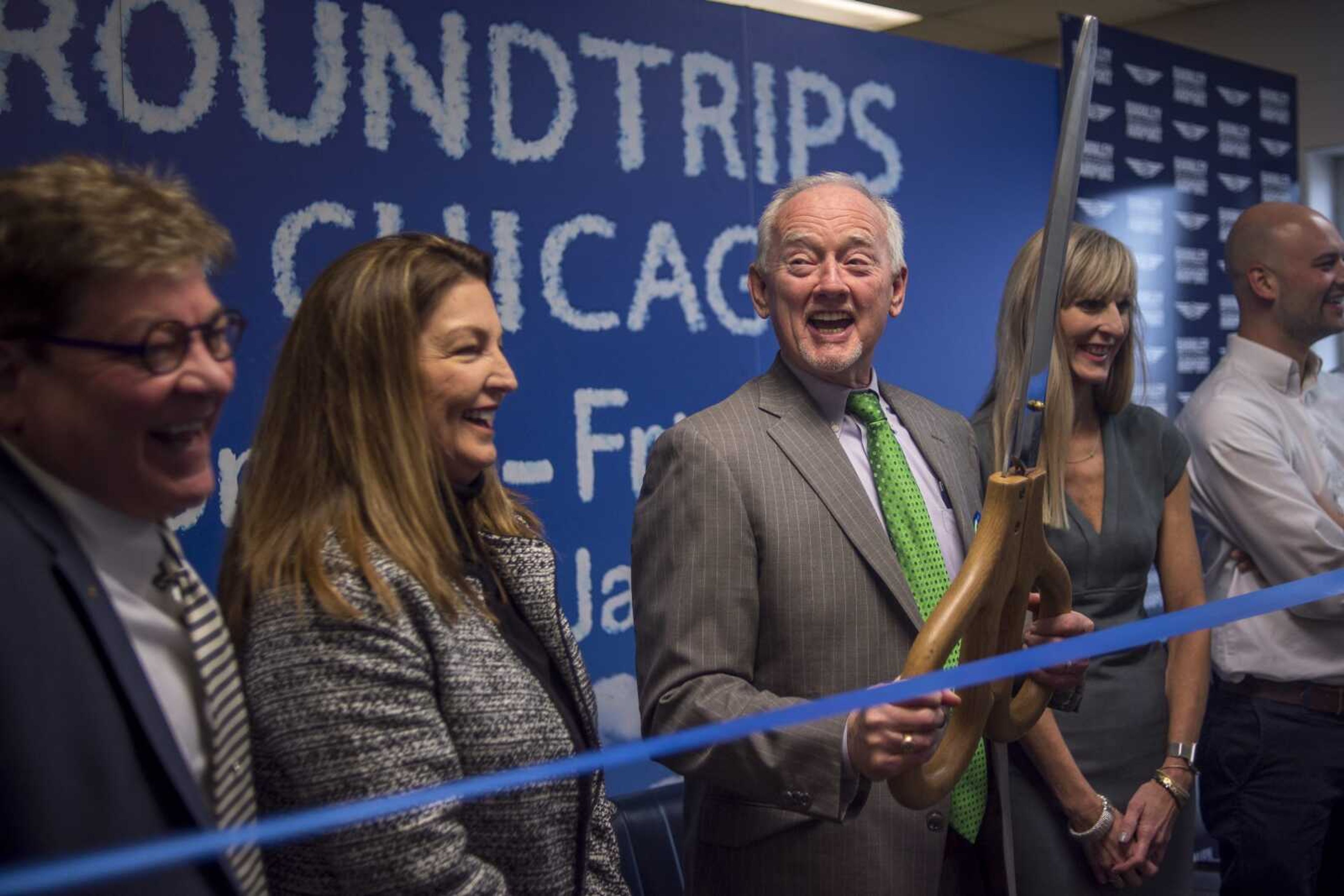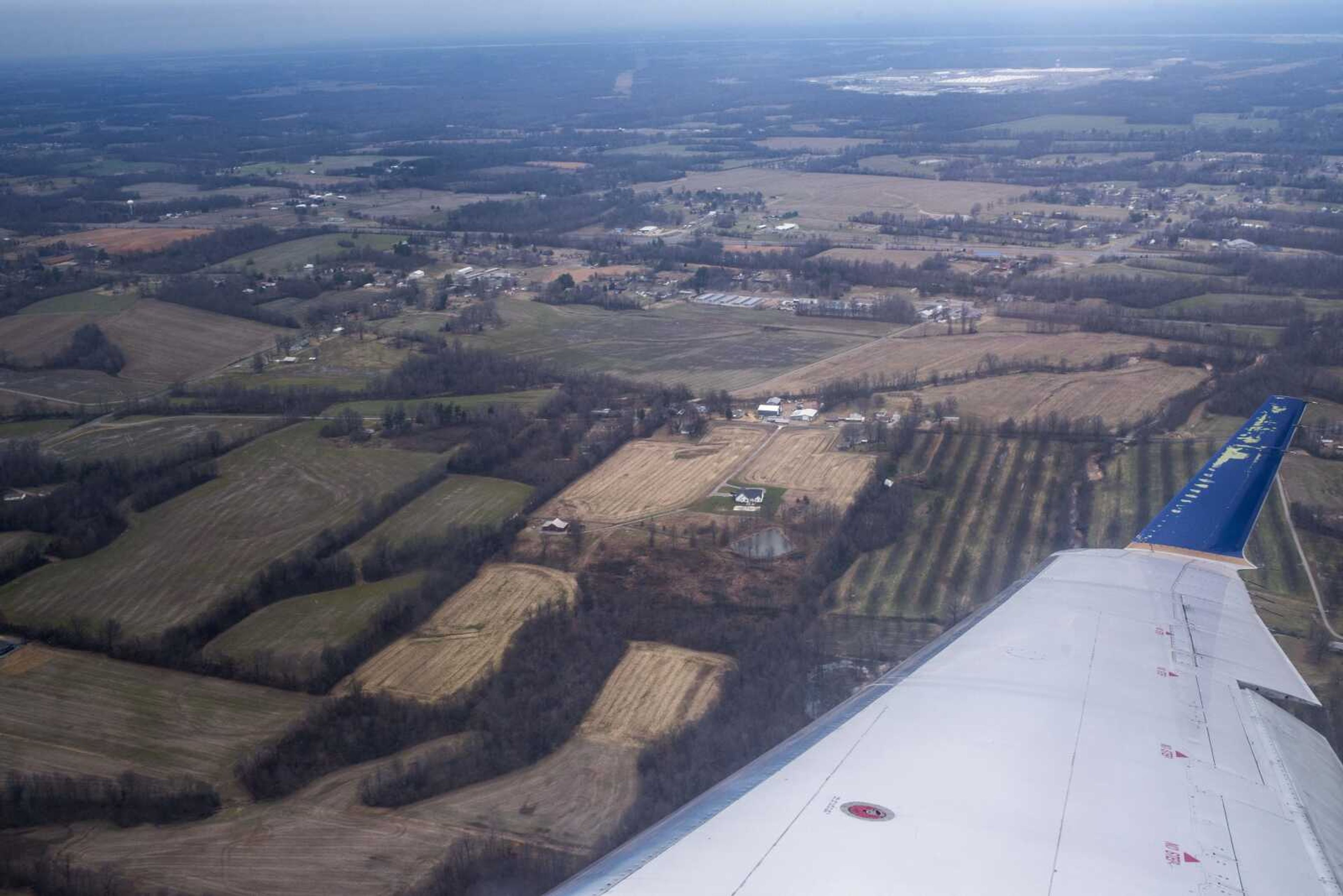Cape airport officials hope arrangement with Paducah leads to increase in passengers
The inaugural flight from Cape Girardeau Regional Airport to Barkley Regional Airport in Paducah, Kentucky, took 16 minutes, 8 seconds. Ryan Dewrock, a member of the Cape Girardeau airport board, timed it on his iPhone. For officials with the Cape Girardeau Regional Airport, the quick trip marked a big step forward, having discontinued flights to Quincy, Illinois, in favor of Paducah in a deal arranged through SkyWest Airlines, doing business as United Express. ...
The inaugural flight from Cape Girardeau Regional Airport to Barkley Regional Airport in Paducah, Kentucky, took 16 minutes, 8 seconds. Ryan Dewrock, a member of the Cape Girardeau airport board, timed it on his iPhone.
For officials with the Cape Girardeau Regional Airport, the quick trip marked a big step forward, having discontinued flights to Quincy, Illinois, in favor of Paducah in a deal arranged through SkyWest Airlines, doing business as United Express. The new plan promises more weekly flights, which airport manager Bruce Loy said he hopes will result in more bookings.
But the day was perhaps even more satisfying for officials with Paducah’s Barkley Regional Airport, whose partnership with SkyWest has proved increasingly fruitful in recent years; so much so that air traffic out of the Paducah airport outpaces that of Cape Girardeau despite Cape Girardeau’s roughly 14,000-person advantage in population over Paducah. According to an Federal Aviation Administration report, the airport saw 20,910 enplanements in 2017, whereas Cape Girardeau saw 6,321 in the same timeframe.
A decade ago, the question of whether there would be any commercial air service in Paducah at all looked uncertain. Delta Airlines discontinued its routes from Memphis, Tennessee, to Barkley Regional Airport in 2009, at which point the airport joined the Essential Air Service Program, a federal subsidy program conducted through the Department of Transportation that helps support smaller airports that would otherwise be shuttered. The airports in Cape Girardeau, Marion, Illinois, and Owensboro, Kentucky, are also among those receiving federal aid through the program.
Shortly after Delta pulled out of Paducah, Barkley Regional Airport signed a deal with SkyWest Airlines which has been continually renewed since 2010. The partnership with SkyWest has consistently helped the Paducah airport increase its services, airport officials said.

Barkley Regional Airport manager Richard Roof said SkyWest approached the Paducah airport last summer with a scheduling plan to allow for more flights while staying within the regulations outlined by the Department of Transportation. Roof said, to his knowledge, the deal among SkyWest, Paducah and Cape Girardeau lets the airports offer more weekly flights than any other airports in the Essential Air Service program.
“It’s a unique situation, being an Essential Air Service community and also being able to offer three flights a day. And we’re talking three round trips a day to Chicago O’Hare,” Roof said. “That means a lot to our customers, so Cape Girardeau benefits and Paducah benefits.”
Daniel Belmont, manager of network planning for SkyWest, said the new deal will mean Paducah and Cape Girardeau now will be responsible for the highest volume of air service out of the roughly 40 Essential Air Service communities SkyWest currently serves.
Cape Girardeau airport officials said they are excited for the opportunity to collaborate with Paducah and SkyWest in a deal with such growth potential.
“From a standpoint of what we’re trying to do, which is growing the airport and increasing the economic impact that it can have here, this is huge for us,” Dewrock said. “Any time you can have more flights and more options, that’s a big plus.”
The flights from Cape Girardeau directly to Chicago take roughly an hour and 40 minutes, while the flights routed through Paducah take about three hours, according to flight schedules provided by the airline.
In the year or so since switching carriers from Cape Air, which offered flights to St. Louis on small airplanes, to SkyWest, which offers flights to Chicago on larger planes, boardings have jumped by more than half, putting the Cape Girardeau Regional Airport much closer to hitting the 10,000-boarding threshold that would bring $1 million more in federal funding. Loy said that while the new Cape Girardeau-Paducah arrangement doesn’t guarantee an increase in boardings, there’s reason to believe it’s a good bet.
“And we’re thinking that consciously or subconsciously, people are more familiar with Paducah, Kentucky, than they are with Quincy, Illinois,” Loy said. “But the thing is we’re still waiting to see.”
tgraef@semissourian.com
(573)388-3627
Connect with the Southeast Missourian Newsroom:
For corrections to this story or other insights for the editor, click here. To submit a letter to the editor, click here. To learn about the Southeast Missourian’s AI Policy, click here.










